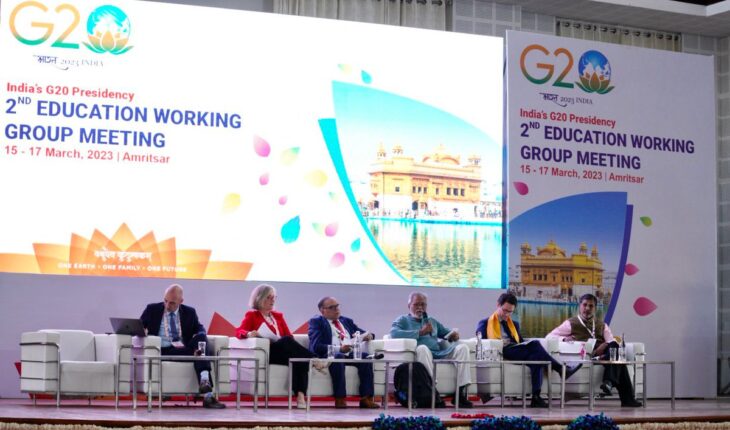Consensus regarding Research and Innovation Collaboration, Foundational Literacy & Numeracy and Life -long learning opportunities were achieved
Amritsar: Day two of the three-day G20 EdWG event at Amritsar was centred around the priority areas ‘Strengthening research and promoting innovation through collaboration’, ‘Building Capacities, Promoting Life-long learning in context of Future of work’ and ‘Ensuring Foundational Literacy and Numeracy especially in the context of blended learning’.
The meeting was chaired by India Chair K. Sanjay Murthy, Secretary Higher Education, with Sanjay Kumar, Secretary, School Education and Literacy, and Atul Kumar Tiwari, Secretary, Ministry of Skill Development and Entrepreneurship as Alternate Chairs. The meeting also included presentations from Research Innovation Initiative Gathering (RIIG), Organisation for Economic Co-operation and Development (OECD) and UNICEF.
The event brought together all G20 member countries, invited countries and international organisations to discuss the importance of knowledge sharing and collaboration to generate solutions to common global challenges. The G20 countries emphasized on identifying and addressing problems that inhibit effective academic research collaborations. It was also acknowledged that, in order to create a multiplier effect for a larger and more inclusive global advantage of our accumulated knowledge and innovation skills, there is now a need for stronger collaboration among countries in research and innovation. Some of the topics covered included developing a framework for joint collaboration for the exchange of researchers and students, international research, data privacy, and other ethical concerns. During the meeting, the delegates also emphasised gender equality and gender inclusion in research arena , as well as improved grassroots participation, in order to bridge the gap between academia, the private sector, and society.
Additionally, in the second and third sessions, the discussion centred around use of Blended learning to achieve Foundational Literacy and Numeracy, the importance of Teacher Training to induce creativity in classroom teaching by designing learning materials and development of skill development frameworks. Collaboration was again a key point of the session with discussions revolving around building partnerships with wider stakeholders including industry to create opportunities for vocational learning for students to bridge the skill gaps and imbalances across G20 nations. Some of the sub-priority areas mentioned for joint action were– to develop curriculum assessment and pedagogical practices, provide equal opportunities, and support to disadvantaged and indigenous communities.
The meeting concluded with remarks from the Alternate India chair, Atul Kumar Tiwari, Secretary, Ministry of Skill Development and Entrepreneurship, who emphasised that in order to achieve SDG 4’s goal of “ensuring inclusive and equitable quality education and promoting lifelong learning opportunities for all,” we must ensure that Blended learning opportunities are accessible to all students.
The 2nd EdWG will conclude on 17th March with discussion around the Priority area ‘Making tech enabled learning more inclusive, qualitative and collaborative at every level’ alongside cultural performances over the Farewell Dinner. The meeting was preceded by a seminar on 15th March, held at Khalsa college on the topic ‘Strengthening research and promoting innovation through richer collaboration’. On the sidelines of the seminar an exhibition was also organised showcasing best practices from various countries, industry, academia and civil society towards forging greater collaboration for advancing research. The ongoing exhibition is open to students, academicians and researchers till 17th March.






